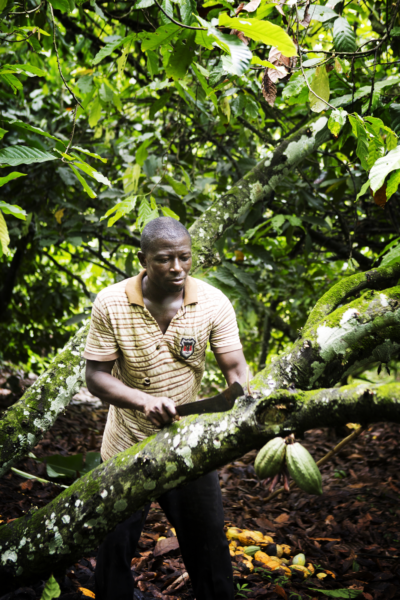Make International Day of Forests a time for climate action
Grow Ahead and Fairtrade International are partnering with Kuapa Kokoo to plant 180,000 trees. You can also be part of this initiative and make a difference.
Today, March 21st, we are celebrating the United Nations International Day of Forests. Forests are essential for life on Earth: purifying the air, stabilizing the climate, regenerating the soil, regulating water supply and supporting the livelihoods of millions of people. Forests are imperative for biodiversity, housing 80% of life on earth.
Fairtrade International and Grow Ahead, an organization that crowdfunds community-led reforestation projects, have partnered with Fairtrade cocoa farmers in Ghana to support the Agroforestry and Cocoa in Ghana Project. Grow Ahead prioritizes high-impact and grassroots projects by partnering directly with small-farmer organizations to plant trees in agroforestry systems. These projects plant trees, income-generating crops like coffee and cocoa, and food together in a ‘food-forest’ system. These systems allow farmers to restore water and nutrients to their soil, which increases food production and pulls carbon out of the atmosphere.
As the climate crisis has become an increasingly urgent issue of our time, reforestation and tree planting has been highlighted as one of the most readily available ways to pull carbon out of the atmosphere. Responsible reforestation is not just what you do but how you do it. With the growing popularity of reforestation as a climate solution there has been an increase in ‘mega-projects’ where companies and organizations plant large plantations of millions of a single non-native tree species. These projects not only lack the biodiversity that creates strong forest systems but are riddled with issues of land tenure, lack of community integration, human rights abuses and long-term sustainability. These carbon offsetting schemes rely on all trees growing to maturity but months and years later we see that for many of these projects the vast majority of the saplings planted never grow to be full trees. Small-scale farmers are instead taking climate action by planting trees in agroforestry systems, planting diverse and native species to boost biodiversity and create strong forest ecosystems.

Climate Change + Farmers
Since 1990, it is estimated that 420 million hectares of forest have been lost through conversion to other land uses. Deforestation for agricultural expansion is a main driver of forest degradation, loss of forest biodiversity and human rights abuses. The industrial food system –primarily cattle ranching and cultivation of soya bean and oil palm– was responsible for 40 percent of tropical deforestation between 2000 and 2010.
Small-scale farmers are not only combating the industrialized food system that is fueling the climate crisis, destroying local ecosystems and biodiversity and violating human rights but actively putting into practice a vision that supports people and the planet.
Building off Indigenous forest farming practices, agroforestry is a system of land management that mimics natural forests, where trees are deliberately planted with agricultural crops and/or animals. This means planting trees, income-generating crops like coffee and cocoa and native food species together in a food-forest system. This allows farmers to restore water and nutrients to their soil, provide food and crops for their families and pull carbon out of the atmosphere.
By working with cooperatives of farmers to plant in agroforestry systems, the trees get planted on individual family and community farms. Farmers become stewards of these trees, ensuring that they grow into strong forest systems. Community-led projects are better equipped to address the local needs and ensure long-term success. As a result, communities have more sovereignty over their food and resources to spread knowledge on sustaining their communities and their lands.
Take Action for International Day of Forests
Grow Ahead and Fairtrade International are partnering with Kuapa Kokoo to plant 180,000 trees in the Agroforestry and Cocoa in Ghana project. Natural forest cover in Ghana and Côte d’Ivoire has declined by more than 70% in the past three decades. The conventional chocolate industry is responsible for deforestation, diversity loss and human rights abuses. Small-scale, Fairtrade farmers like those at Kuapa Kokoo are rejuvenating native forests and supporting their communities through growing cocoa in food forest systems. Take Action for International Day of Forests by supporting the Agroforestry and Cocoa in Ghana Project.
